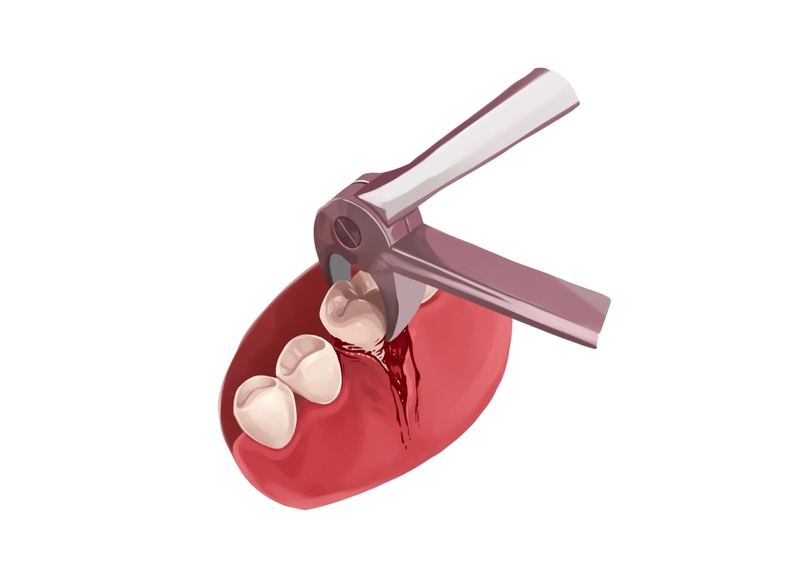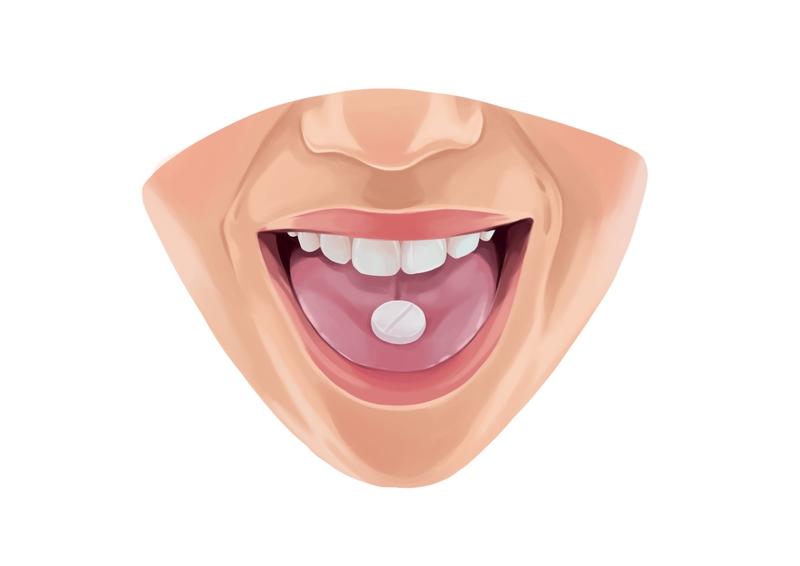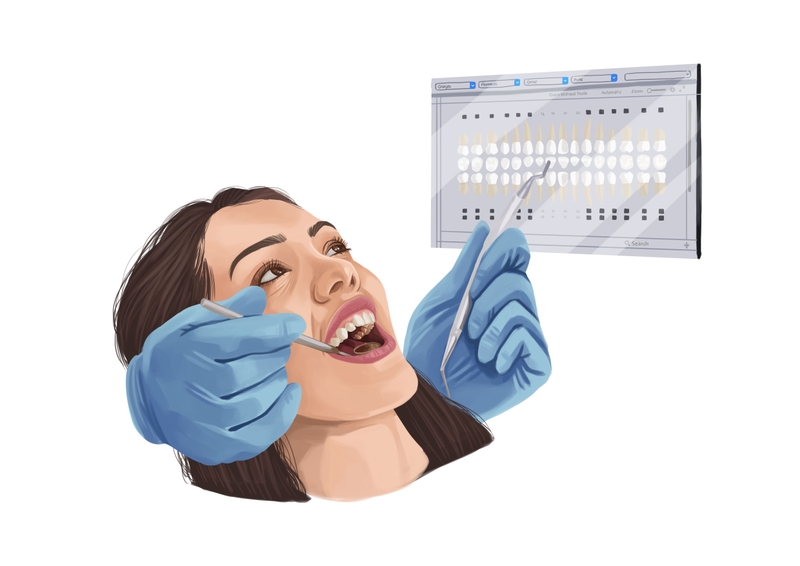- Stop bleeding and swelling by using gauze pads or absorbent bandages and cold packs. Avoid smoking and drinking alcohol for at least the first two weeks after extraction.
- Eat soft foods and drink cautiously for the first week to avoid dislodging the blood clot and to promote healing. Reduce pain with prescribed medications and home remedies such as ice packs and cold compression.
- Maintain good oral hygiene by brushing and flossing carefully. Take time to rest and avoid excessive physical activity for the first 48 hours.
You can count on us in the event of a dental emergency. Find local dentists open now with Authority Dental. We have over 1,500 locations, and we are open 24 hours a day.
Curious about the best practices after tooth extraction? Here is everything you need to know.
Control bleeding and swelling

Picture by Authority Dental under CC 2.0 license
Forming a blood clot is the first goal of the recovery process. The first couple of days after a tooth removal will be when the majority of the healing and closing of the wound takes place. You can expect to see minimal bleeding from the gums. To absorb the blood from the wound, a gauze pad is recommended. Tea bags or other absorbent pads could be used as an alternative.
To reduce swelling, use cold packs to both lower the inflammation and to numb the area.
Avoid smoking and alcohol
It might be common knowledge, but it must be stated that smoking after an extraction is not allowed for at least two weeks. Smoking produces toxic compounds that can interact with an open wound, causing pain and excessive bleeding. In addition, the inhalation force you use while smoking creates undue pressure on the area, which can dislodge the clot.
”I often explain it like this: think of the clot not as a simple scab, but as a specialized, biological scaffolding,” Lee says. ”It not only stops the bleeding; it is also packed with all the cells and growth factors—the "construction crew"—that your body needs to build new gum tissue and bone underneath,” he adds, warning that ”if you do anything that creates suction or pressure, like smoking or drinking through a straw, you can rip that entire scaffolding out.”
Lee stresses that ”When that happens, the construction crew is gone, and you are left with an exposed, raw nerve and bone. That is what a dry socket is, and it is excruciatingly painful. ”
Alcohol also increases the risk of a dry socket and should be avoided until after the first week.
Eat soft foods and drink carefully
An oral surgeon will advise a healthy, balanced diet to help the body heal, but it is essential to maintain a consistent food intake for the first week. Due to the tenderness, it is highly recommended to avoid solid foods and those with small particles. For the first week, softer foods will be best for keeping the area clean.
Foods you might try include:
yogurt,
smoothies,
protein shakes,
applesauce,
mashed potatoes,
scrambled eggs,
oatmeal,
cottage cheese,
broth-based soups.
Try to eat a variety of foods to ensure you get adequate nutrition. Eat foods that are rich in protein and fiber. Of course, ice cream and milkshakes are perfectly acceptable foods as long as they are eaten in moderation.
Be sure to drink plenty of liquids and stay hydrated to increase cleanliness and encourage the recovery process. Actions such as sucking through a straw or eating hard and crunchy foods can strain the gums and should be avoided.
Minimize pain

Picture by Authority Dental under CC 2.0 license
It is not unusual for a dentist to prescribe medication to manage pain levels for the first couple of days. Common pain prescriptions include Tylenol #3, Norco, Hydrocodone, Lortab, and Percocet. After a couple of days, the discomfort will subside to a point that over-the-counter medicine will be sufficient. Avoiding contact with the site will reduce the chances of severe pain and dislodging any healing that has been completed thus far.
Applying ice packs and cold compression to the affected area are some home remedies for reducing pain and swelling.
Maintain proper oral hygiene
Maintaining proper oral hygiene plays a significant role in the healing process. In the first few days following surgery, the gums are at their greatest vulnerability. That is why performing extra dental care is important - floss to prevent small particles from reaching the gums, drink plenty of water, and replace the gauze as needed.
Cleaning of the wound with warm water or salt water is also recommended. Salt water can aid the healing process, but it should not be used for rinsing until the second day of recovery. Use eight ounces of water with 1/2 teaspoon of salt and swish carefully. This may occur every few hours to several times a day. Avoid using over-the-counter mouthwashes, as most of them contain alcohol.
Brush and floss as usual, but avoid the extraction site for the first couple of days. You should still brush all your remaining teeth, doing so carefully.
Take time to rest
The body needs rest to recuperate and heal. High physical activity may cause strain on the gums, so it is recommended to minimize excessive activity for at least the first 48 hours. When at rest, elevate your head at night to promote blood flow to the tooth extraction site.
Book a control appointment

Picture by Authority Dental under CC 2.0 license
In some cases, it may be necessary to have a follow-up appointment. However, that is not often the case. If there is still severe bleeding from the site after one day, please contact your dental office. You should also call if you are experiencing pain beyond slight discomfort, as you may have a dry socket.
More concerning symptoms include fever, chills, vomiting, ear pain, difficulty breathing, chest pain, and drainage from the wound. If you experience any of these symptoms, please contact your dental office immediately. Even if you experience these symptoms outside of office hours, there should be an emergency contact that your office uses for situations like these.
If you did not discuss it before the extraction, you can also use a follow-up appointment to explore the treatment options available to replace the missing tooth. As the area heals, you can consider all options and decide which one is best for you.

FAQ
Why is tooth removal aftercare important?
Proper aftercare following tooth removal will promote blood clotting, reduce bleeding, help you avoid unnecessary pain, and decrease recovery time.
Should I brush and floss the site of the extracted tooth?
While keeping the extracted tooth clean is great, brushing and flossing at the site in the initial 24-hour period should be avoided. Brushing will likely be tender and may increase the chances of dislodging the blood clot that has formed, which could disrupt the healing process. Still, be sure to brush your remaining teeth carefully to prevent decay.
Harry Lee, DMD
After every tooth extraction I perform, I tell my patient the same thing: your only job for the next two days is to be a bodyguard for the blood clot. All of our post-op instructions—no straws, no smoking, eat soft foods—are designed around this one single goal. Healing is not passive; it is an active construction project, and that blood clot is the most important piece of equipment.